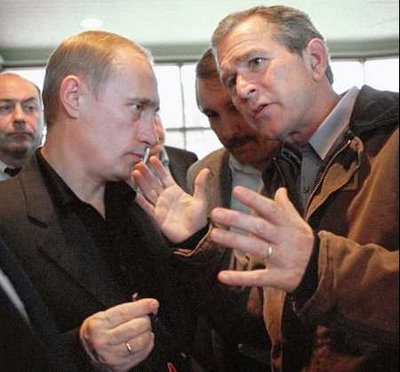 FP Passport's editor, Blake Hounshell, strongly criticizes President Bush for failing diplomacy 101, "a game of give-and-take in which trading away concessions allows you to get what you want on your top priorities." Blake's post articulates a number of policies the United States is pursuing and Russia stands against (of which we've mentioned on this blog earlier).
FP Passport's editor, Blake Hounshell, strongly criticizes President Bush for failing diplomacy 101, "a game of give-and-take in which trading away concessions allows you to get what you want on your top priorities." Blake's post articulates a number of policies the United States is pursuing and Russia stands against (of which we've mentioned on this blog earlier).
He points to President Bush's comments declaring "no trade-offs" in regards to providing some breathing room for offering NATO membership to Ukraine and Georgia. The purpose of which would be to gain on another issue, perhaps the missile defense proposal in Poland. While I agree with Blake, that our President is missing a useful tool in his diplomacy belt, it should be of no surprise.
The Bush doctrine is predicated on two key elements: the United States continues to operate in its unipolar moment and has a moral obligation to spread freedom to closed societies. Bush's disdain towards concessions reflects upon the former. While NATO membership for Georgia and Ukraine will have little impact on opening their societies, it will however slide them closer towards the United States at the expense of faux democratic Russia. Although we don't, Bush does see a link between NATO enlargement and democracy, "NATO is an organization that's peaceful. NATO is an organization that helps democracies flourish. And democracies are good things to have on your border."
With the end of his Presidency creeping ever-closer, granting membership to Ukraine and Georgia would be viewed as a victory for Bush (in the face of likely failures; see Israel/Palestine). One might even expect him to dismiss tenants of diplomacy, for opportunities to sure up his legacy.